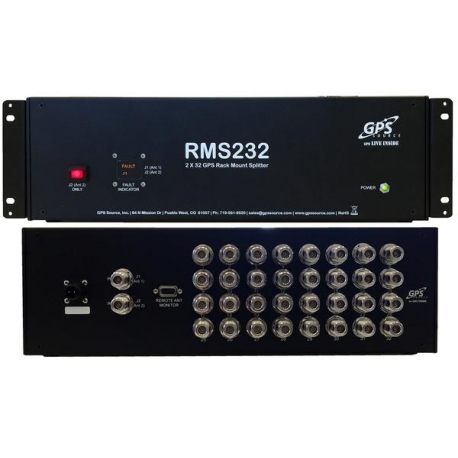 View larger
View larger RMS232 
GPS Rack Mount Splitter, 2 Inputs, 32 Outputs, 19 x 5.25Chassis, 4dB Amplification
- 32 GPS/GNSS Output Ports
- -48VDC Power Supply Option
- Embedded Antenna Health Sensor
- Automatic Internal Antenna Port Switch
- External Antenna Port Switching Capability
- Passes GPS L1/L2, GLONASS L1/L2, Galileo, Compass
- Antenna Fault Indicator Panel
- Dual Power Option
DESCRIPTION
The RMS232 amplifies and splits the GPS/GNSS signal. It includes dual input ports and 32 output ports.
The dual input ports connect two GPS receive antennas. The output ports grant up to 32 GPS/GNSS receivers signal access at one time.
Typically, the RMS232 is configured with an 110VAC input (-48V telecom power input also available) and a regulated DC output voltage that is passed to the antenna input ports in order to power an active GPS antenna on that port. In this scenario, the RF outputs (OUT1 – OUT32) would feature a 200 Ohm DC load to simulate an antenna DC current draw for any receiver connected to those ports.
Redundancy is acquired through the use of a primary antenna and a backup antenna. The ability of the RMS232 to switch antennas allows all connected GPS devices to remain fully functional in the event of an antenna failure. Faults are indicated on the front panel LED and status via a DB9 interface.
Within the RMS232 is an antenna health sensor and an embedded antenna switch. The sensor monitors the health of the primary antenna connected to the splitter.
Based on the information provided by the sensor, the splitter will switch to the secondary antenna in the event of a failure with the primary antenna.
If the failure in the primary antenna is resolved, the splitter will automatically switch back to the primary.
The embedded switch has been designed so it can be controlled externally via an external rocker switch that can override the internal automatic switch mechanism.
The dual power supply option allows two internal power supply units to share the load. If one unit is not available (internally or externally), the other will seamlessly take over without any loss in power. The fault will be indicated on the front panel LED and status via a DB9 interface.
| Description | Part-Number |
|---|---|
| RMS232 | RMS232-xx |

